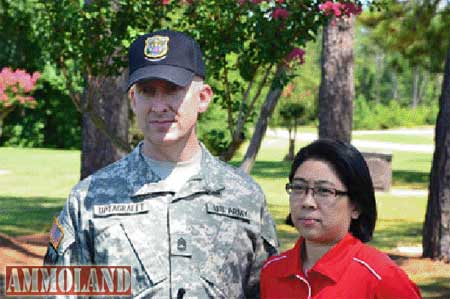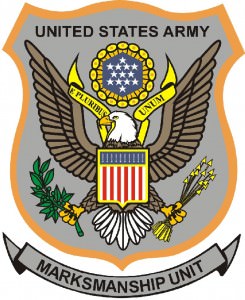By Michael Molinaro, USAMU PAO

FORT BENNING, Ga. –-(Ammoland.com)- Perseverance is defined as “continued effort to do or achieve something despite difficulties, failure, or opposition.” Sgt. 1st Class Eric Uptagrafft and Navy Reservist PO1 Sandra Uptagrafft epitomize the word.
Sgt. Uptagrafft, U.S. Army Marksmanship Unit, was an Olympian at the 1996 Atlanta games. A prone rifle shooter, his results were not to his liking and he vowed to return one more time.
PO1 Uptagrafft competed in four Olympic trials in Women’s air and sport pistol and left each one without a position on the Olympic team. But she didn’t quit and this past June competed in her fifth trials, attempting again to achieve a lifelong goal.
Because of their perseverance, the husband and wife will both compete in London with each other by their side, a reward for years of not giving up on their dreams.
“To be an Olympian, you have to work harder than you have worked on anything in your life and be single-minded and dedicated to your goals to be the best in your sport,” said Sandra. “This applies to your physical training, mental training and technical skills. It also helps to have the support of everyone close to you in your life. For me, I was lucky enough to have the unconditional love and support of my husband, Eric.”
Their story has so many twists and turns it could fill an entire book. For example, Sandra was a member of the USAMU and is now a Navy Reservist. Eric was a Navy Reservist and is now a member of the USAMU. They both had the same boss during deployments overseas. The difference is Eric’s deployment was in 2007 in Kuwait; Sandra’s was in 2010 in Afghanistan.
However, the best one might be that in 2000 if either one had made the Olympic team this love story very well may have never taken place.
Both had been favored to make the Sydney Olympics in 2000 but they each lost out at the Olympic trials. As a consolation prize, the military sent them to the Conseil International du Sport Militaire (CISM) Games, the military’s equivalent of the Olympics, in Turkey.
“Housing was at the Turkish Military Academy—their version of West Point,” Eric said. “We were locked down. All we could was work out, play tennis, and hang out. We got to talking and hit it off. If either of us had made the Olympic team we wouldn’t have met.”
Despite finding the love of his life, Eric was on the brink of closing the door on his second love, shooting. After missing out on the Sydney Games, he was hired by an aerospace engineering firm in Colorado to be a structural engineer on the newest and coolest telescope that was being designed to be sent into space.
But he was bored. He would shoot when he could and said he was putting up good scores and winning matches, but he lacked the consistency it takes to sustain a world-class capability. The bitter taste of 1996 still lingered more than a decade later and he knew that he had unfinished business to take care of.
“I was in the (USAMU) on the service rifle team earlier in my career and knew it was time to go back,” said Eric. “Once I got reassigned there and put on the International Rifle team it was time to get serious.”
He found that consistency and started medaling in almost every World Cup he was entered in. He was ranked second in the world. He fared so well that he earned enough points to qualify for the Olympic team without having to go through the trials. He had made his way back. That was phase one of the plan. Phase two was to bring his wife with him to London as a fellow athlete, not as a guest.
Sandra is one of the country’s top female pistol shooters but couldn’t get over the hump at the trials. She missed out on four trials from 1996-2008. She deployed to Afghanistan in 2010 with the 3rd Naval Construction Regiment. She was tasked with providing global satellite telecommunications and computer networking to ensure the unit could communicate with higher and subordinate commands. While there, she used her leave to compete at the World Championship in Munich and posted her best scores ever.
“I have always planned to keep competing as long as I am physically capable of holding on target, aligning the sights and squeezing the trigger,” she said. “That was proof that I was still capable of doing it and I started to really focus on 2012.”
With Eric nervously watching from an inconspicuous spot at the range in June, Sandra entered the final day of trials neck-and-neck with two other competitors vying for one berth on the team. Her persistence and the sixteen-year journey were down to one final round of shooting.
“It was roughest final I have ever been through in my life, including my own. I was much more nervous there then any final I have ever shot,” Eric said.
After the final, Sandra put down the gun and exhaled a deep breath. She said she knew it was a close points race and did not know if she’d done enough to win the trials, so she was really nervous. She didn’t know what those in attendance had already known.
“Eric came to give me a hug and he was very choked up with emotion, so I could not tell if he was happy for me or sad that I came so close yet again,” Sandra said. “Then they told me I won. First I was in shock and disbelief, doubting that it was true, then happy to have finally done it.”
The Uptagrafft’s departed on a plane together July 20 for Copenhagen, Denmark, where the entire U.S. shooting team will train before arriving in London before the opening ceremonies. Everyone competing at the Olympics is looking for an advantage, some way to get a step ahead of the competition.
“I will have the benefit of having my husband and best friend to talk to, encourage me, to hang out with–to enjoy the whole Olympic experience with,” said Sandra.
Sandra competes on July 29 (Air Pistol) and Aug. 1 (Sport Pistol) while Eric competes on Aug. 3. Then, medal or no medal, they will have more reason to celebrate a few days later when they share their wedding anniversary on Aug. 5, touring London and experiencing the Olympics as fans. They may end up being the only athletes who will ever admit that they were glad they missed out on competing in an Olympics.
“Sometimes things happen for a reason and you find out it was a blessing in disguise,” Sandra said.
About USAMU
The USAMU enhances the Army’s recruiting effort, raises the standard of the Army’s marksmanship proficiency, and supports the Army’s small arms research and development initiatives in order to raise the Army’s overall combat readiness. For more information on the U.S. Army Marksmanship Unit, contact the Public Affairs Office at (706) 545-5436, Michael.Molinaro@usaac.army.mil or www.USAMU.com.

